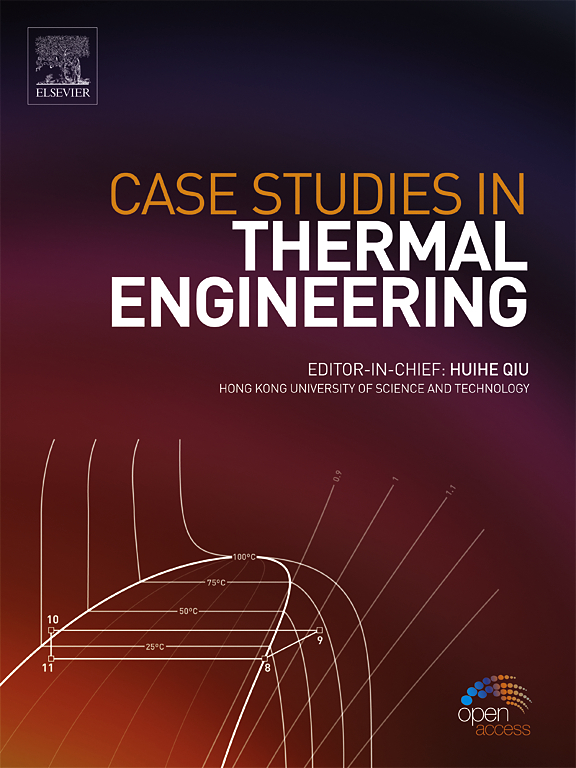Effect of portable cooling device on thermal comfort of medical protective clothing
IF 6.4
2区 工程技术
Q1 THERMODYNAMICS
引用次数: 0
Abstract
Medical protective clothing is important for maintaining the health and safety of the wearer, but its thermal comfort is poor. To improve the thermal comfort, a portable cooling device was designed and a medical protective clothing cooling system was constructed using this device. Through simulations, the actual cooling capacity of the portable cooling device was studied at various temperatures; the micro-environment temperature variation rule for medical protective clothing based on the cooling device was explored under different temperatures and activity intensities, and the cooling system's effect on the wearer's skin temperature was clarified. The results show that the temperature difference between the inlet and outlet of the portable cooling device is maintained at approximately 13 °C under various temperatures, the cooling power is approximately 31.2 W. After cooling system operation for 2 h, the micro-environment temperature and average skin temperature maximum drops are 6.0 °C and 5.6 °C, respectively. The system can reduce the protective clothing's micro-environment temperature and the human skin temperature effectively under various environmental temperature and activity intensity conditions. Which are of significance for verification of the feasibility of a new concept for cooling system design and the resulting improvement in the thermal comfort of medical protective clothing.医用防护服对维护穿戴者的健康和安全非常重要,但其热舒适性较差。为了改善热舒适性,设计了一种便携式冷却装置,并利用该装置构建了医用防护服冷却系统。通过模拟,研究了便携式降温装置在不同温度下的实际降温能力;探索了基于降温装置的医用防护服在不同温度和活动强度下的微环境温度变化规律,明确了降温系统对穿着者皮肤温度的影响。结果表明,在不同温度下,便携式冷却装置的进出口温差保持在约 13 °C,冷却功率约为 31.2 W。冷却系统运行 2 小时后,微环境温度和平均皮肤温度的最大降幅分别为 6.0 °C和 5.6 °C。该系统能在各种环境温度和活动强度条件下有效降低防护服的微环境温度和人体皮肤温度。这对验证冷却系统设计新理念的可行性和改善医用防护服的热舒适性具有重要意义。
本文章由计算机程序翻译,如有差异,请以英文原文为准。
求助全文
约1分钟内获得全文
求助全文
来源期刊

Case Studies in Thermal Engineering
Chemical Engineering-Fluid Flow and Transfer Processes
CiteScore
8.60
自引率
11.80%
发文量
812
审稿时长
76 days
期刊介绍:
Case Studies in Thermal Engineering provides a forum for the rapid publication of short, structured Case Studies in Thermal Engineering and related Short Communications. It provides an essential compendium of case studies for researchers and practitioners in the field of thermal engineering and others who are interested in aspects of thermal engineering cases that could affect other engineering processes. The journal not only publishes new and novel case studies, but also provides a forum for the publication of high quality descriptions of classic thermal engineering problems. The scope of the journal includes case studies of thermal engineering problems in components, devices and systems using existing experimental and numerical techniques in the areas of mechanical, aerospace, chemical, medical, thermal management for electronics, heat exchangers, regeneration, solar thermal energy, thermal storage, building energy conservation, and power generation. Case studies of thermal problems in other areas will also be considered.
 求助内容:
求助内容: 应助结果提醒方式:
应助结果提醒方式:


